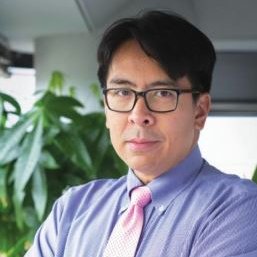Colin Powell School

What brought you to City College and the Colin Powell School?
I decided to retire from 16 years of trading, portfolio management, and derivatives research. I thought I could try teaching. I reached out to Professor Kevin Foster and made a pitch to him that I could teach students to develop their second-level thinking. The whole idea of second-level thinking is to stop thinking of the obvious and instead think what average people don't think and see what average people don't see.
What current projects are you working on at the Colin Powell School?
In addition to teaching economics, I have created a small cohort of students who want to learn advanced topics in business or financial economics beyond the regular curriculum. I created independent study seminars for them to work with me, and I have also provided ongoing mentorship. The seminars have included Art Management, Real Estate Finance & Investment, Mergers & Acquisitions with Leveraged Buyout Modeling, Money & Banking, Lean Startup Strategies, and Corporate Strategy.
Your students have been placed at very prestigious companies. What is your approach to mentorship, and how has your mentorship aided the students in obtaining these roles?
As a mentor, I don't tell them what to do. I never tell them how to become me, because they have not lived my life story. I help them create their own story. This is not a story about short-term achievements; it is about them asking themselves, where do I want to be and why and how will I get there? I show them how to seek their own true north through a heavy dose of self-awareness exercises. For example, students do their own SWOT analysis (Strengths, Weakness, Opportunities, and Threats). I also try to push them out of their comfort zone. When they say, "I did my best," I tell them, "That's good but your best isn't my best." When every one of them got hired for a summer internship, I congratulated them, but I also told them, let's move on and think about where to go next and what we need to do to get to the next step. The principle is never to be complacent!
Also, the mentorship process must be student-driven. I cannot be a good mentor if the students don't want help. So, the first step is to wait for the students to ask for help. Some students accept it very early on while some students continue to mentally fight back.
Tell me about your students. How have they responded to your mentorship?
The students who have worked with me have been extremely hard-working and motivated. They take really hard classes with me because they want to be better. They are the ones who are in my office at least twice per week. They are the students who study in my office until 2:00 AM. My office is not really my office. At times, my office has eight students in it. It is for them to use to better themselves by interacting with others in the cohort who have similar ambitions, mindsets, and grit. They all accept one fundamental life purpose I install in them; to be better today than yesterday.
What can the Colin Powell School do to help your efforts?
Help get the students in a mentoring program earlier in their academic careers. Mentorship is a crucial component of personal development, and it must start early. It is not a short-term investment but a long journey. You mentioned my ‘recent’ cohort, but they aren't recent; I have been investing significant time and effort into mentoring them.
Thank you very much for all of your excellent work with the students and for interviewing with us today.